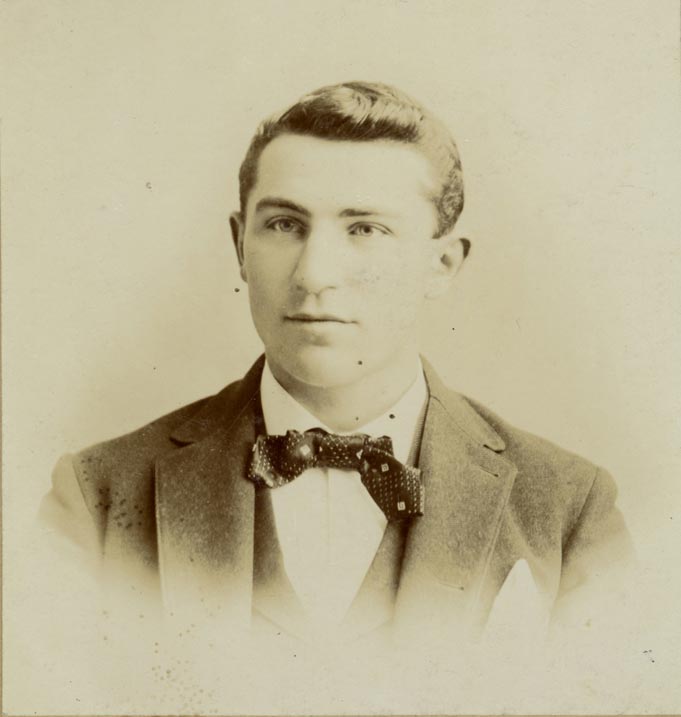Crimping
Who was the Crimper King of Port Townsend?
Maxwell Levy has become known as the “Crimper King”of Port Townsend. Levy ran a boarding house and worked in partnership with Ed Sims, who was a shipping commissioner.
Crimping was illegal, but it was generally up to the shipping commissioners to stop.
Top image: Maxwell Levy (left) with business partner Ed Newmann (right of little girl) (JCHS 2005.74.44)
As with many raucous ports, early Port Townsend was quite notorious for its “crimping,” now commonly referred to as “shanghaiing.” The historical reality was usually less violent than the legends and stories that have come down to us. In the tales, unfortunate soldiers recently ashore have a couple drinks, get hit on the head, and are whisked away to a ship on which they recover and are forced into hard labor for months or years.
Such things might have taken place, but Port Townsend’s “crimps” were more on the order of unethical businessmen. Sailors, freshly discharged and paid off, would come ashore with dollars in their pockets and nowhere to be. A port town’s crimp was always on hand to offer such a fellow room and board. With full pockets, the rates probably sound quite reasonable, but eventually the money runs out. The crimp extends credit and the debt piles up.
The crimp’s other customers, the captains and agents of commercial vessels, show up in need of crews. They come to the crimps who are now in possession of any number of indebted sailors. The captain pays the crimp. The sailors clear their debt and get work. The captains sail out with fresh crews.
Simms and Levy
The crimping trade was never quite legal, but was far less nefarious or risky than lurking in back alleys with blackjacks. Many of Port Townsend’s “crimps” became quite wealthy. One of the city’s most successful turn-of-the-century residents, also mayor, senator,) Ed Simms, is often referred to as a crimp. In fact, Simms was a shipping commissioner responsible for curtailing crimping. That crimping was rampant throughout his term and that he became exceedingly wealthy are perhaps coincidental.
The most notorious and successful crimp of the day was Maxwell Levy. He earned the title “Crimper King” of Port Townsend. Levy owned the boarding house and businesses to which the sailor became indebted. Levy introduced the sailor to a Captain in need of crew and received not only the full amount the sailor owed, but also a finder’s fee. This was deducted from the sailor’s wages, so that at the end of the voyage he was already short of funds, trapping him in the cycle.

Ed Sims, partner of Max Levy and later a state legislator – (JCHS 2005.32.259)
Levy’s boarding house, the New Sailors’ Home, with its convenient location by the port, provided cozy berths ashore. Now known as the Cotton Building, it has served as the city’s police station and today provides a venue for events, festivals, community gatherings, and meetings.
The crimping scheme worked like this:
- A sailor would stay in the boarding house while on leave, soon running out of money.
- Levy would offer him credit at his businesses
- Levy would help then the sailor find a new contract and take him to meet the captain
- The captain signs the sailor onboard and pays Levy the amount the sailor owes him, deducted from the sailor’s wages.Levy is also paid a finder’s fee by the Captain.
- The sailor completes the voyage and is paid his remaining wages at the end. He is now in port again and short on funds, trapping him in the cycle.
The Legends Live On
All this being said, Port Townsend residents love their tales. Ask enough shopkeepers, barbers, and bartenders and someone will tell you of the secret tunnel that ran from their basement out to ships in the harbor. The downside of the yarns is that downtown Port Townsend sits barely above sea level. Every basement has to deal with flooding. Any notion of underground tunnels must first account for how to resurface without drowning. Technically, crimping remained legal for some time, and there was no need for such clandestine operations.
But don’t let us ruin a good story. Send us your favorite tale of Port Townsend’s notorious shanghai men.
Learn More of Our History
